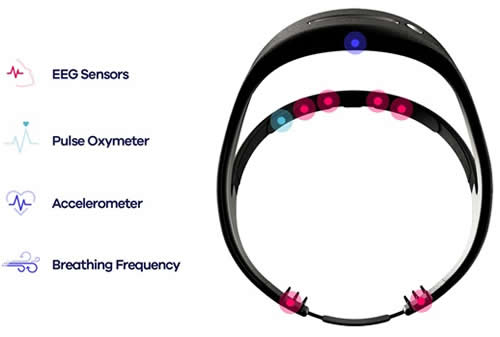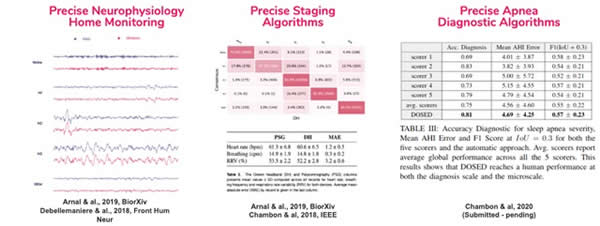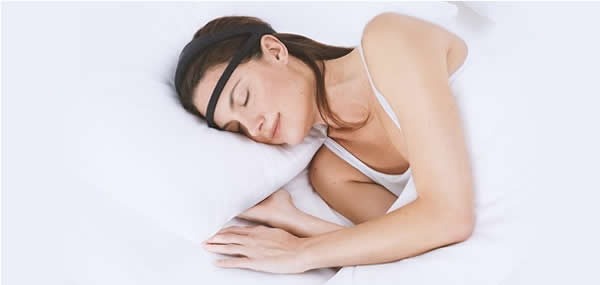Positive Health Online
Your Country

Bringing Sleep Clinic Quality to the Bedroom
listed in sleep and insomnia, originally published in issue 265 - September 2020
Sleep influences how well we live our lives in myriad ways - from our physical and mental health and performance to our productivity at work, mood and cognitive abilities. Sleep is even linked to certain long-term health issues. But historically, the how and why of sleep have remained a mystery. In fact, one could even argue that today, despite all the medical and technological advances, despite how important we know sleep is, it remains, for most of us, a black box.
This paradox is one of the driving forces behind the work we do at Dreem. Our mission is to empower people across the world, give them the keys to their own health, and their own brains, with access to the type of sleep knowledge that was once confined to labs and clinics. A health revolution driven by access to information, made possible by technology.
Inside the Sleep Clinic
Since the 1960s, the study of sleep has essentially remained unchanged. Typically, a patient presenting symptoms of a sleep disorder is referred to a sleep clinic by their GP. After some considerable wait time, the patient arrives at the sleep clinic in the early evening for their one night stay. Upon arrival, a trained expert will spend an hour or so wiring the patient up, gluing electrodes to their head and chest, plugging in various wires and sensors. This trained expert will spend the night on standby in case any electrodes become detached. Throughout the night this tangle of sensors (known as polysomnography or PSG) measures the patient’s brain activity (EEG), heart rate (ECG), respiratory airflow, pulse oximetry, eye movement and muscle activity. After a night of questionable comfort for the patient, a trained expert will comb through the PSG readings collected through the night and manually score the different sleep stages, noting any anomalies.
In terms of precision, the PSG is unparalleled. But its scope remains confined to the sleep clinic. The equipment is costly, fragile, cumbersome and requires on-hand trained experts. The impracticalities of the PSG has repercussions for patient-care and the world of clinical research. If we think again of this idea of sleep as a black box, the PSG is only able to offer us the smallest sliver of a view inside.

Tech-Powered Change
At Dreem, we weren’t satisfied with this sliver. We wanted to crack the black box wide-open for people. And we knew that in order to do this we’d need to take the PSG’s level of precision but make it portable, comfortable, and easy-to-use. And that is how the Dreem headband was born. The Dreem headband weighs 120g, it’s adaptable, flexible, wrapped in fabric. It is equipped with 7 sensors that measure brain activity, heart rate, movement and respiratory rate variability (RRV). Its built-in algorithms perform sleep-staging analysis of these readings providing a detailed and accurate vision of the wearer’s night.
In the headband’s companion app, this data is used to create nightly recaps, display weekly reports and provide personalized insights and recommendations that draw from Cognitive Behavioral Therapy, all aimed at helping Dreem users improve and optimize their sleep.
Scientific rigour isn’t always the fastest route, but it’s something we’ve always held ourselves to at Dreem. We never wanted to be just another tracker, we were very aware that to make a real impact and be taken seriously, we’d need to go through the proper channels of clinical validation.
Our peer-reviewed study, a joint clinical trial between researchers at IRBA (French Armed Forces Biomedical Research Institute) and Dreem’s scientific research team, tested the Dreem headband’s signal acquisition and performance of its sleep staging algorithms against the PSG, scored manually by five experts.
25 subjects completed an overnight sleep study at a sleep center wearing a PSG and a Dreem headband simultaneously. The researchers then compared the measure of brain activity (EEG), heart rate, breathing frequency and respiration rate variability (RRV), as well as the sleep staging.
The results showed that the Dreem headband acquires EEG measures that correlate with that of the PSG and measure biomarkers reliably throughout the night, and that the algorithm performs sleep-staging with similar accuracy to that of the five experts manually scoring the PSG readings.

These results, cause for much celebration at Dreem HQ, will help us to move faster and more efficiently towards our goal to democratize the study of sleep, with ripple effects that could touch the lives of people across the world, accelerate clinical research, and advance remote patient care.
Spreading the Length and Breadth of Research
In the world of research, the PSG represents something of a bottle-neck, vastly limiting the scope and scale of research projects to a limited number of subjects, in a clinical setting. Having an ambulatory and accurate device like the Dreem headband has opened up new opportunities in the world for clinical research, making large-scale, longitudinal studies a viable option.
Take for example a handful of the winning projects from our very first call for research proposals last year:
- A research team at UCLA studying sleep in hunter-gatherer communities, taking Dreem headbands to the Hadza tribe live in relative isolation in north-central Tanzania and the Tsimané people in the lowlands of Bolivia;
- Pilot work by a research team at Cambridge University into longitudinal recordings and sleep improvement in patients with Huntington’s disease;
- The development of sleep-based biomarkers for the early diagnosis of Alzheimer's’ disease led by teams at Harvard Medical School and MIT.
Facilitating access to reliable, precise sleep data for a broad variety of research fields is something that we are deeply proud of at Dreem. But we were always very clear that we wanted to extend access to objective sleep data well beyond the world of research and into doctors’ offices, hospitals, workplaces and bedrooms across the world.
Bridging the Gap: Remote Patient-Monitoring
One of the many things the COVID-19 situation has brought to the light is the need for improved remote-patient care and monitoring solutions. In the past few months we’ve seen more and more telehealth solutions spring up, with video consultations becoming something of a norm for non-urgent GP consultation and mental health professionals. This need for efficient remote-patient care and monitoring is not, I believe, a temporary one.
It is estimated that between 50 and 70 million Americans suffer from some sort of sleep disorder, with around 90 distinct sleep disorders.[1] It is believed that 80 to 90% of adults with sleep-disordered breathing are undiagnosed and untreated.[2]
In this context, the patient at the sleep clinic is a sort of best-case scenario. Even if this best-case scenario means waiting months for an appointment and spending a single uncomfortable night in a sleep center, with results perhaps impacted by the fact that sleeping in an unusual setting, attached to multiple wires for one night, is not a true representative of their nightly sleep. The reality is that the sleep clinic patient is actually a minority among the actual number of sleep disorder sufferers in the world today.
The difference the Dreem headband could bring, by complementing and facilitating the doctor-patient relationship, is significant. The patient can monitor their sleep with the headband from the comfort of their own bedroom, not for just one night, but over a week or two, then sharing this data with their doctor, in both the diagnostic phase as well as monitoring the effectiveness of any eventual treatments, be it a CPAP for sleep apnea or a course of Cognitive Behavioral Therapy for insomnia. This potential extends beyond the realm of sleep and into the diagnosis and treatment of other health conditions- like neurodegenerative diseases and mental illnesses.
We believe this could be the first step towards tomorrow’s healthcare. A fully integrated, personalized and continuous experience, seamlessly integrated in our daily life and designed for people. This will not only improve access to healthcare, it will transform the model and improve the outcomes at scale: more people accessing care, better care, more proactive care, lower costs, higher results.
Work Hard, Play Hard… Sleep Hard?
We rarely think of the relationship between sleep and work, but perhaps we should. One could argue that Thomas Edison founded a sleep deprivation cult by inventing artificial light. Since then productivity and sleep have been seen as contradictory entities. Corporate culture has historically prized individuals who work longer, pull all-nighters, sleep less. And yet, sleep deprivation has been shown to increase stress, negatively impact memory, cognitive function and the immune system and long-term health. In short, employees who don’t feel or perform at their best, and a less productive workforce. The cost of poor sleep can amount to $7k per year per employee in decreased productivity, absenteeism, increased healthcare costs, workplace accidents and so on.[3] Part of what we do at Dreem is to attempt to represent sleep and productivity as two halves of the same whole, bringing sleep knowledge into the workplace, with masterclasses, short-term programs with the headbands, and personalized care for employees experiencing sleep health issues.

The Revolution Starts in Bed
Of course, whether it’s via the clinic, the hospital or the workplace, the person we’re most trying to help is the individual. Since starting Dreem in 2015, we have collected over 1M nights of data, and thousands of people across the world now use Dreem nightly. They range from sleepers who are simply curious about their sleep as a way to measure and monitor their global health, to people who have been suffering with sleep issues for decades. We are in constant contact with many of our users, and two major themes run across their stories - the first being a sense that they are finally in control of their sleep.
This sense of control speaks to the transformative power of knowledge. And perhaps is the greatest testament to this idea of bringing sleep-clinic level precision to the bedroom- handing people the keys to their sleep, making them the owners of their own health by giving them access to decades of sleep research.
It’s shocking to see how much time it takes from a scientific or medical discovery to the integration into our daily lives. We believe that Dreem can bridge this gap by developing radical software and hardware innovations that will make the best of scientific / medical methods and make knowledge personal and actionable for millions.
Healthy Sleep, Healthy Brain
Over the past 50 years, there have been several micro-revolutions in how people care for their physical and mental health - integrating sport into their daily routine, managing their diet, the current move of meditation into the mainstream. And yet, sleep remains the one that got away. And yet, as I started this piece by saying, sleep has such major ramifications across physical and mental health and well-being. When we talk to our users about how better sleep is changing their lives, they don’t tell us that their sleep onset is now 20 minutes shorter, instead they talk about being in a better mood with their family, feeling less stressed, being able to find their words faster and find creative solutions. When we take a look at this from a neuroscientific perspective this makes total sense, as sleep is responsible for so much essential maintenance in our brains, from flushing toxins, to regulating emotions, consolidating memories.. the list goes on and on. Cracking open the black box of sleep is the first step towards living life to its fullest potential.
References
1. Institute of Medicine (US) Committee on Sleep Medicine and Research; Colten HR, Altevogt BM, editors. Sleep Disorders and Sleep Deprivation: An Unmet Public Health Problem. National Academies Press, Washington DC, 2006.
2. Young T, Evans L, Finn L, Palta M. Estimation of the clinically diagnosed proportion of sleep apnea syndrome in middle-aged men and women. Sleep. 1997.
3. The Cost of Poor Sleep, National Safety Council 2017.
Comments:
-
No Article Comments available